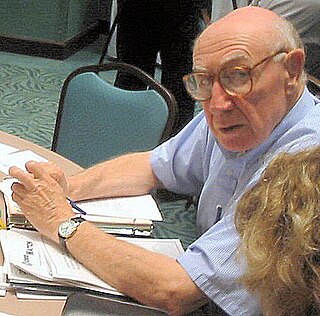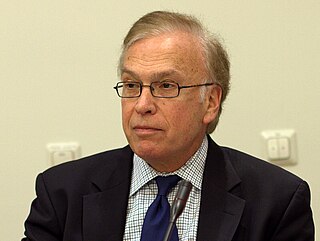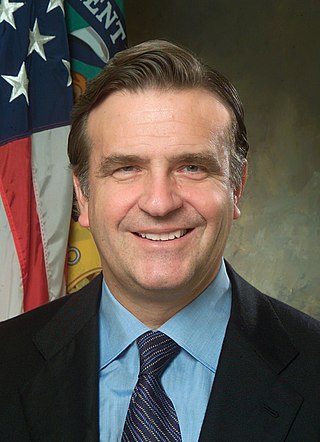Philanthropy is a form of altruism that consists of "private initiatives for the public good, focusing on quality of life". Philanthropy contrasts with business initiatives, which are private initiatives for private good, focusing on material gain; and with government endeavors that are public initiatives for public good, such as those that focus on the provision of public services. A person who practices philanthropy is a philanthropist.

The John D. and Catherine T. MacArthur Foundation is a private foundation that makes grants and impact investments to support non-profit organizations in approximately 117 countries around the world. It has an endowment of $7.6 billion and provides approximately $260 million annually in grants and impact investments. It is based in Chicago, and in 2014 it was the 12th-largest private foundation in the United States. It has awarded more than US$7.92 billion since its first grants in 1978.

City Journal is a public policy magazine and website, published by the conservative Manhattan Institute for Policy Research, that covers a range of topics on urban affairs, such as policing, education, housing, and other issues. The magazine also publishes articles on arts and culture, urban architecture, family culture, and other topics. The magazine began publishing in 1990.

Christopher Lydon is an American media personality and author. He was the original host of The Connection, produced by WBUR and syndicated to other NPR stations, and created Open Source, a weekly radio program on WBUR.
In relation to public services, the voluntary sector is the realm of social activity undertaken by non-governmental, not for profit organizations. This sector is also called the third sector, community sector, and nonprofit sector. "Civic sector" or "social sector" are other terms used for the sector, emphasizing its relationship to civil society. Voluntary sector activities are important in many areas of life, including social care, child care, animal welfare, sport and environmental protection.
The John M. Olin Foundation was a conservative American grant-making foundation established in 1953 by John M. Olin, president of the Olin Industries chemical and munitions manufacturing businesses. Unlike most other foundations, it was charged to spend all of its assets within a generation of Olin's death, for fear of mission drift over time and to preserve donor intent. It made its last grant in the summer of 2005 and officially disbanded on November 29, 2005. It had disbursed over $370 million in funding, primarily to conservative think tanks, media outlets, and law programs at influential universities. It is most notable for its early support and funding of the law and economics movement and the Federalist Society. "All in all, the Federalist Society has been one of the best investments the foundation ever made," wrote the Foundation to its trustees in 2003.

The Financial Institutions Reform, Recovery, and Enforcement Act of 1989 (FIRREA), is a United States federal law enacted in the wake of the savings and loan crisis of the 1980s.

Pablo Samuel Eisenberg was an American scholar, social justice advocate, and tennis player. He played in Wimbledon five times, making the quarterfinals once, and won a gold medal at the 1953 Maccabiah Games in Israel. He was a Senior Fellow at Georgetown University's Public Policy Institute. Prior to his role at Georgetown, he served for 23 years as executive director of the Center for Community Change, a progressive community organizing group.

Lester M. Salamon was a professor at Johns Hopkins University. He was also the director of the Center for Civil Society Studies at The Johns Hopkins Institute for Health and Social Policy Studies. Salamon has written or edited over 20 books in addition to hundreds of articles, monographs and chapters that have appeared in Foreign Affairs, The New York Times, Voluntas, and numerous other publications. He was a pioneer in the empirical study of the nonprofit sector in the United States, and is considered by many experts in his field to have been a leading specialist on alternative tools of government action and on the nonprofit sector in the U.S. and around the world.

Robert King Steel is an American businessman, financier and government official who has served as Deputy Mayor for Economic Development in the administration of New York City Mayor Michael Bloomberg, Under Secretary for Domestic Finance of the United States Treasury, chief executive officer of Wachovia Corporation and vice chairman of Goldman Sachs. He has also served as chairman of the board of trustees at Duke University and the Aspen Institute. In May 2014, he was tapped to succeed Joseph R. Perella as chief executive officer of Perella Weinberg Partners, a private investment banking and asset management firm.

Linda J. Bilmes is an American public policy expert who is the Daniel Patrick Moynihan Senior Lecturer Chair in Public Policy and Public Finance at Harvard University. She is a faculty member at the Harvard Kennedy School where she teaches public policy, budgeting and public finance. She served as Assistant Secretary and Chief Financial Officer of the US Department of Commerce during the presidency of Bill Clinton.
Peter Karoff was chairman and founder of The Philanthropic Initiative (TPI) a nonprofit organization founded in 1989 that promotes philanthropy. TPI designs, manages, and evaluates philanthropic programs for individuals, families, corporations, and foundations.
Lucas C.P.M. Meijs a Dutch organizational theorist and Professor Volunteering, Civil Society and Businesses at the department Business-Society Management of the Rotterdam School of Management, Erasmus University Rotterdam and Professor Strategic Philanthropy at the Erasmus Centre for Strategic Philanthropy.

The RGK Center for Philanthropy and Community Service is a research center at University of Texas at Austin located in the Lyndon B. Johnson School of Public Affairs. The teaching and research of the RGK Center are focused in the areas of nonprofit organizations, philanthropy, social entrepreneurship, and volunteerism.

Philanthropy in the United States is the practice of voluntary, charitable giving by individuals, corporations and foundations to benefit important social needs. Its long history dates back to the early colonial period, when Puritans founded Harvard College and other institutions. Philanthropy has been a major source of funding for various sectors, such as religion, higher education, health care, and the arts. Philanthropy has also been influenced by different social movements, such as abolitionism, women’s rights, civil rights, and environmentalism. Some of the most prominent philanthropists in American history include George Peabody, Andrew Carnegie, John D. Rockefeller, Henry Ford, Herbert Hoover, and Bill Gates.
The American Civil Rights Institute is an American conservative non-profit organization that opposes affirmative action. It was founded by Ward Connerly and Thomas L. "Dusty" Rhodes in 1996 in Sacramento, California. As of 2017 it operates from a mailing address in Coeur d'Alene, Idaho. It has also been called the American Civil Rights Coalition.
Julian Wolpert is Bryant Professor Emeritus of Geography, Public Affairs, and Urban Planning at Princeton University's Woodrow Wilson School, where he taught from 1973 to 2005 and chaired the Program in Urban and Regional Planning. He was previously a member of the Regional Science Department at the University of Pennsylvania (1963–73).
James Piereson is an American scholar.

Jacob "Jack" Rosenthal was an American journalist, editor and executive best known for his work at The New York Times. He won the Pulitzer Prize for Editorial Writing in 1982.
The Manhattan Institute for Policy Research is an American conservative think tank focused on domestic policy and urban affairs. The institute's focus covers a wide variety of issues including healthcare, higher education, public housing, prisoner reentry, and policing. It was established in Manhattan in 1978 by Antony Fisher and William J. Casey.










